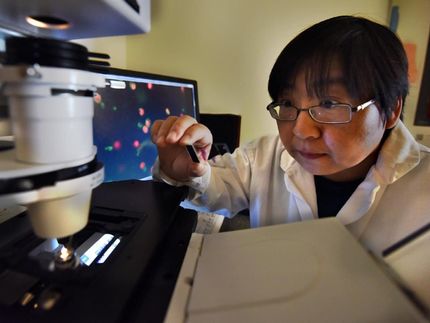A Tumour Suppressor in Mice and Men
Researchers in Munich discover a cellular mechanism that can protect against tumours
Advertisement
When protective mechanisms in cells fail, certain genes can cause tumours - and cancer. One of these oncogenes is Bcl-3, which can lead to leukaemia, among other diseases. Scientists from the Max Planck Institute of biochemistry in Martinsried, Germany, working with colleagues at the Ludwig Maximilians University of Munich (LMU), have discovered a mechanism which activates and regulates Bcl-3. Reinhard Fässler led a team which has published an article on this topic in the latest edition of Cell. A protein called Cyld controls Bcl-3 - and thus protects mice from tumour growth. The researchers were able to describe the cellular signalling path which causes uncontrolled growth when the Cyld gene is defective. Furthermore, there is evidence that such a defective Cyld gene may be the root cause of kidney, liver, uterus, and large intestine tumours. Cyld could possibly be one of Bcl-3's most important opponents - in mice and men.
Growth, separation, and differentiation of cells is one of the body's most well regulated processes. Even just a single cell escaping this regulation can lead to a tumour. Oncogenes are, in this sense, like ticking time bombs, which can cause cancer. Their activity is controlled in healthy cells by tumour suppressor genes. The cellular "opponents" of the Bcl-3 oncogene, however, had not yet been known before this study. The protein has to find its way to the nucleus to function as what is called a "transcription factor". These initiate and support genetic transcription - DNA fragments codified by proteins. This process is necessary for transcribing genetic information during protein synthesis.
During the process of genetic transcription, Bcl-3 cooperates with other, unusually important transcription factors which belong to the NF-B-family. Its five members influence a broad spectrum of disease processes, like infections and immune reactions, as well as cell growth. Two representatives of this group, p50 and p52, must themselves first be activated in order to initiate the transcription. One important mechanism for doing that is Bcl-3 binding. Until now, we have known that Bcl-3 can cooperate with p50 or p52, causing intense cell growth and ultimately cancer. For such cooperation, however, Bcl-3 has to first enter the nucleus, where DNA and the NF-B proteins can be found. The team from Munich, led by Prof. Reinhard Fässler, showed that the transcription factor is helped by a molecular "ticket".
Large numbers of ubiquitin molecules can be attached in sequence to proteins. A certain kind of binding marks this protein as "rubbish" which has to be removed. Another type of ubiquitin attachment to proteins functions as a kind of transport signal. It negotiates the transfer, for example, of proteins into the nucleus. The study shows that this is the case with Bcl-3. It only functions like this, however, when Cyld does not get in the way. This protein was first found in patients suffering from cylindromas. These are tumours that grow on the face, neck, and scalp. Cyld is a deubiquitinase - an enzyme that removes ubiquitin groups from other proteins. "We could show in our study that Cyld proteins can accumulate around the nucleus," says Fässler. "They can intercept Bcl-3 there and prevent it from being imported into the nucleus, by removing ubiquitin appendages." This is the first evidence ever of a specific mechanism that regulates and controls the Bcl-3 oncogene.
The team of researchers from Munich flawlessly reconstructed Cyld interaction with Bcl-3. They demonstrated every step in the process, from the recruiting of Cyld over to the nuclear membrane, to the ubiquitinisation of Bcl-3, and Cyld's reversal of this process. They also showed in detail that Bcl-3 collects without Cyld in the nucleus, and can cause cell proliferation with p50 and p52. All in all, it seems not unlikely that Cyld functions as a tumour suppressor in mice and in humans. In humans, there is evidence that a defective Cyld gene can have negative consequences, like the largely benign tumours of cylindromas. The researchers also found very little, or no, Cyld in the cells of other skin tumours. The situation is similar in some cases of liver, kidney, and uterine cancer. "Cyld is expressed in every cell in the body", Fässler says. "I believe personally that the deubiquitinase activity of Cyld functions as a tumour suppressor in all tumours in which the Bcl-3 oncogene plays a role."
Original publication: R. Massoumi, K. Chmielarska, K. Hennecke, A. Pfeifer, R. Fässler; "Cyld Inhibits Tumor Cell Proliferation by Blocking Bcl-3-Dependent NF- B Signaling"; Cell 2006.

























































